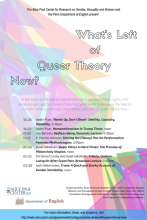- Thursday, October 26, 2017 - 4:30pm to 6:00pm
Fisher-Bennett Hall 401
Sponsored by the Department of English in partnership with the Alice Paul Center
Free and open to the public
Jasbir K. Puar is Associate Professor of Women's & Gender Studies at Rutgers University. She has also been a Visiting Lecturer in the Department of Performance Studies at NYU and a Visiting Fellow at the Institute for Cultural Inquiry in Berlin. She received her Ph.D. in Ethnic Studies from the University of California at Berkeley in 1999 and an M.A. from the University of York, England, in Women's Studies in 1993.
Puar is the author of Terrorist Assemblages: Homonationalism in Queer Times (Duke University Press 2007), which won the 2007 Cultural Studies Book Award from the Association for Asian American Studies. A redacted version of Terrorist Assemblages has been translated into French as Homonationalisme. Politiques queers après le 11 Septembre, (Editions Amsterdam, 2012).
Puar's edited volumes include "Queer Tourism: Geographies of Globalization" (GLQ: A Journal of Lesbian and Gay Studies); and co-edited volumes on "Sexuality and Space" (Society and Space); "Interspecies" (Social Text); "Viral" (Women's Studies Quarterly).
Her articles appear in Gender, Place, and Culture, Radical History Review, Socialist Review, Feminist Legal Studies, Antipode: A Radical Journal of Geography, Feminist Studies, and Signs: Journal of Women in Culture and Society. She also writes for The Guardian, Huffington Post, Art India, The Feminist Review, Bully Bloggers, Jadaliyya, and Oh! Industry. Her work has been translated into Polish, French, German, Croatian, Swedish, and Danish.
Puar's forthcoming monograph, Affective Politics: States of Debility and Capacity (Duke University Press, 2014) takes up questions of disability in the context of theories of bodily assemblages that trouble intersectional identity frames.
Her major awards include the Edward Said Chair of American Studies 2012-13 at the American University of Beirut, a Rockefeller Fellowship at the Center for Lesbian and Gay Studies at the CUNY Graduate Center (1999-2000) and a Ford Foundation grant for archival and ethnographic documentation work (2002-2003). She recently received the 2013 Modern Languages Association Gay Lesbian/Queer Caucus Michael Lynch Award for her years of scholar-activist work. In January 2013 she was honored with the Robert Sutherland Visitorship at Queens University, awarded to "a notable individual with expertise in race relations." She has also received two awards for her graduate teaching, in 2011 from the Graduate School of Rutgers University and in 2012 from the Northeastern Association of Graduate Schools.
Distinguished lectureships include the Whidden Lecturer at McMaster University (2013); Distinguished Visiting Professor at the American University of Cairo (2012); the Institute of Women's Studies' Shirley Greenberg Lecture at the University of Ottawa (2012). Puar has recently delivered keynote addresses at the Somatechnics Missing Link Conference (Linkoping, Sweden, 2013); the Australian Critical Race and Whiteness Studies Association Conference (Adelaide, 2012); Gender, Violence and Agency in the Age of Globalization Conference (Vienna, 2012); the Southeastern Women's Studies Association Conference (George Mason, 2012) and Human Rights Beyond the Law, Jindal Global Law School (New Delhi, 2011).
She is a 2013-14 Society for the Humanities Fellow at Cornell University, where she will be working on her third book, titled Inhumanist Occupation: Sex, Affect, and Palestine/Israel.
In The Right to Maim Jasbir K. Puar brings her pathbreaking work on the liberal state, sexuality, and biopolitics to bear on our understanding of disability. Drawing on a array of theoretical and methodological frameworks, Puar uses the concept of “debility”—bodily injury and social exclusion brought on by economic and political factors—to disrupt the category of disability. She shows how debility, disability, and capacity together constitute an assemblage that states use to control populations. Puar's analysis culminates in an interrogation of Israel's policies toward Palestine, in which she outlines how Israel brings Palestinians into biopolitical being by designating them available for injury. Supplementing its right to kill with what Puar calls the right to maim, the Israeli state relies on liberal frameworks of disability to obscure and enable the mass debilitation of Palestinian bodies. Tracing disability's interaction with debility and capacity, Puar offers a rethinking of Foucauldian biopolitics while showing how disability functions at the intersection of imperialism and racialized capital.

 Department of English
Department of English
